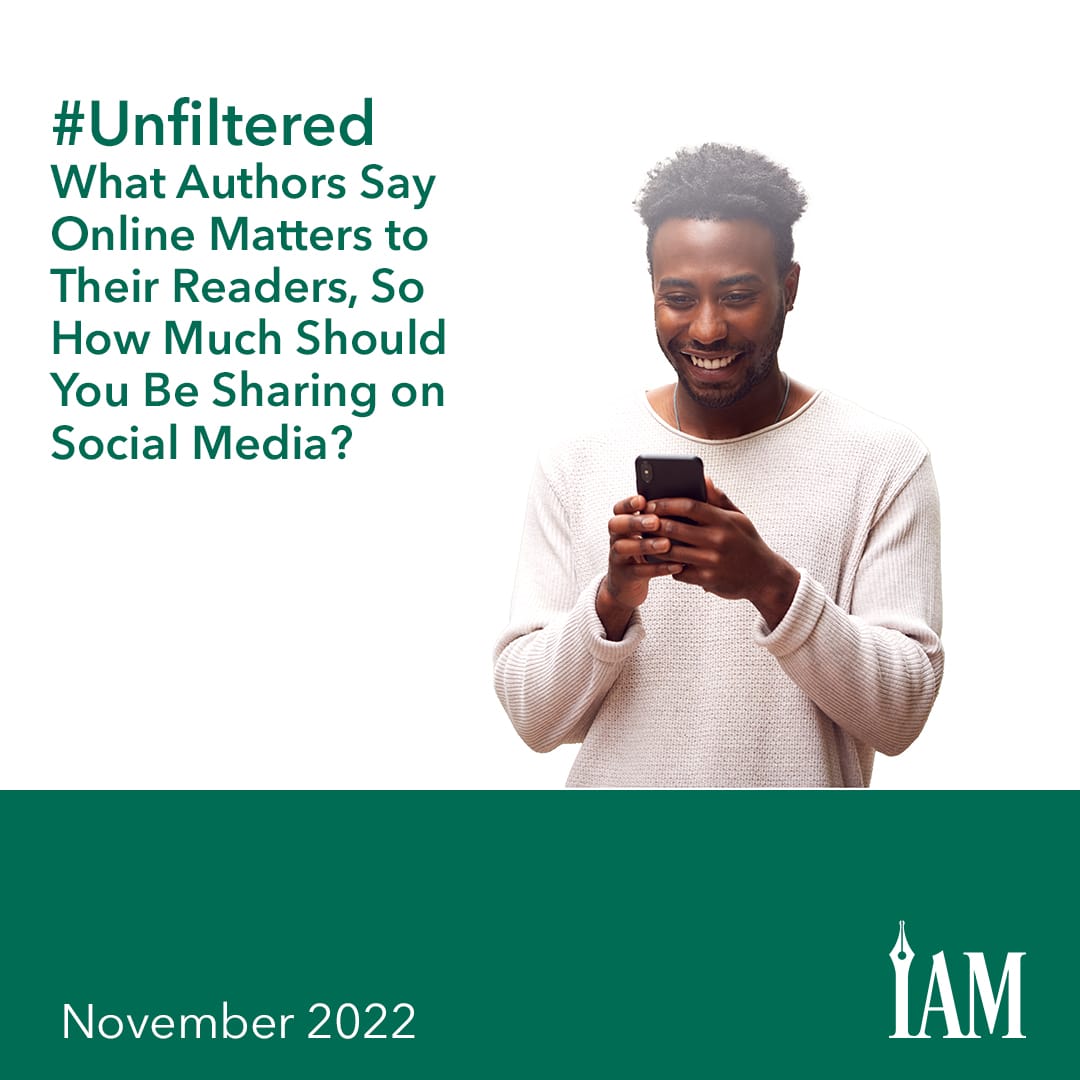What Authors Say Online Matters to Their Readers, So How Much Should You Be Sharing on Social Media?
Being a writer never stops. If you’re not writing, you’re often thinking about it. If you’re not doing either, you’re likely to be looking at cover designs, formatting, talking to other authors—the list goes on.
And that’s before you even get to marketing your work, whether through blogging, promo stacking, newsletter swaps, or social media. But that last one can feel like a separate beast all on its own. Social media platforms provide a unique chance for authors to interact with their readers on a more personal level, but they can make it even more difficult to balance what your audience sees of your life beyond your writing career.
Obviously, if social media is something you include in your marketing, you have to find the time for it, but it’s even more important to decide which platforms you should use, and what you want to share with your audience—or what they want to see from you.
The answers to these can vary, but they’re crucial to consider when shaping and maintaining your author brand. And although we can’t give you a right way to manage your social media presence, we can help you understand what other authors are doing and why it matters so you can decide which options are right for you.
Pick Your Platforms
Social media is ever changing, with new platforms, algorithms, and trends constantly coming and going. It can be difficult to choose which platforms are best for growing and connecting with your audience. A report by DataReportal (https://datareportal.com/social-media-users) in August of this year lists eighteen top social sites, though there are many smaller ones as well. That said, certain platforms currently vie for some of the top spots when ranked by number of active users, depending on your region and the demographics you’re trying to reach.
Facebook is the largest social media platform in the world with almost 3 billion users, according to DataReportal. Instagram is also up there with almost 1.5 billion users. Both platforms are owned by the same parent company, Meta; however, Instagram also has the benefit of an established, active reading community. To date, users have shared more than 81 million posts using the #Bookstagram hashtag to connect with other readers, making it easy for authors to reach their target audiences by doing the same.
TikTok reached a billion users in 2021 and is still growing. According to TikTok’s own statistics, seventy percent of their users agree that “they feel a deeper connection to people they interact with on TikTok than on other platforms,” and two out of three users are likely to buy something while using the platform. In fact, selling books on TikTok has become so significant that Nielsen, Forbes, and Bloomberg have all covered the platform’s impact on the book industry this year.
Twitter has only 486 million users, in comparison, but it is growing and has 31.8 million monetizable daily active users, which has grown 15.4 percent since its 2021 second-quarter report. Like Instagram, Twitter also hosts an active reading community, which has grown in recent years through the use of hashtags like #booktwitter, #booktwt, and #writerwednesday.
Of course, not every platform works well in connecting to readers in every genre. As you consider where to build your social media presence, look at where you’re most likely to find readers based on each site’s demographics和 where other authors in your genre have built their audiences. Then think about the kinds of content you prefer to make and what you’re likely to keep up with. If you hate creating videos, there’s no point in focusing on TikTok or any other video-based platform.
The key to good social media performance is consistency. You need to show up and post regularly to keep yourself and your books at the top of people’s minds, so to start, choose fewer platforms to focus on rather than trying to spread yourself thin over every platform.
Decide What You Want to Share
Once you’ve decided where to reach your readers, you’ll also need to consider what to share with them. Some authors let it all hang out on social media. They share health issues, family goings-on, and their thoughts and opinions on everything under the sun. Others stick to sharing only book news, teasers on what’s coming next, writing inspiration, and other author-related news. Still others find a balance somewhere in the middle.
Which one is right? There is no right or wrong, only what you are comfortable with. Don’t feel you have to share everything if you don’t want to. Equally, don’t feel you have to keep quiet if you want to share. However, here’s what you need to think about when making your decision:
- What do your readers enjoy?
- Do they like hearing your latest shenanigans?
- Do they want to get to know you better or would they rather you just post book news?
When you post on social media, you are developing your author brand. If you share too much outside of what readers have come to expect of you, will that affect your brand negatively? It’s worth considering, whether you’re just starting out or you’ve been posting on social media for years.
As you’re finding the answers to the questions above, try posts with different content to see which get the most interaction, or simply ask your followers what they prefer to see. The results will help give you a better idea of what your audience likes and what you should prioritize sharing with your readers.
Speak Your Mind (or Don’t)
For those who choose a more open-door approach to what they share online, it’s best to consider ahead of time whether you’ll make public any of your more personal beliefs. According to the 2020 Consumer Culture Report by 5WPR, an independent public relations agency, 83 percent of millennials want companies to “align with their values.” Seventy-six percent would also like CEOs to talk about issues they are passionate about, and 62 percent would rather have products from companies that show what they stand for politically and socially.
That’s pretty clear. However, it is also the case, from the same report, that 65 percent of millennials have boycotted a company that didn’t share their views on particular issues. Although the percentages are lower for older generations, it’s still the case that over half of people at any age prefer to support companies that share their values.
Everyone has strong opinions on certain things. We’ve all seen battles break out and sides drawn on the internet over everything from whether Star Wars or Star Trek is better to far more serious and controversial topics, such as the striking down of Roe v. Wade.
Whichever way you lean on the big issues, you will invariably lose readers if you make your opinions known. Someone somewhere will disagree with what you have to say, but those readers you gain are more likely to stick around and appreciate you. The only other consideration is how much you feel you can keep quiet on any controversial issues that arise—particularly when staying quiet could be seen as support for views and ideas you would never tolerate.
It’s not a simple decision to make, but only you know how comfortable you feel talking about big issues, whether those conversations fit in with your author brand, and whether you’re okay with losing readers who don’t agree with you.
Be Consistent
No matter where you build your platform or what you decide to share with your readers, understand that your decisions will create expectations among your audience and become part of your author brand. You might be known for gloriously funny Rom-Coms and a sharp wit on your social platforms too. You might be the go-to writer for deeply dark and disturbing Horror tales, with gallows humor to match in person.
What you need to be on your website and social platforms is consistent. Wherever you post, use the same username, if possible, on every platform to make yourself easier to find. Try to keep the same look and feel to your posts wherever readers find. They should be able to look at your posts and immediately recognize that it’s you before they’ve read what you’ve said. That’s strong branding, and it helps with your marketing by building brand recognition.
Finally, try to post consistently. If there’s been tumbleweed blowing across your social accounts for months, don’t be surprised if no one’s interested when you have a book out.
Research your chosen platforms’ algorithm and find out what the recommended number of posts is per week, then try to post at least the minimum number on each platform.
Keep It Up
Creating an initial social media plan can offer plenty of challenges already, but when deadlines creep closer or other life responsibilities get in the way, it can be hard to stick to the consistent posting schedule you create. Still, with a little planning and some additional software, you can make it work.
Some authors choose to plan out their social posts for each quarter rather than creating posts individually. If you don’t have time to do that, at least try to plan out the upcoming month, as creating posts in batches can save time and help ensure your content is cohesive across your accounts. If the software is within your budget, social media scheduling programs, such as MeetEdgar, HootSuite, and CoSchedule, allow users to create a calendar of prepared posts and queue evergreen content to repost regularly.
Pro Tip: When planning and scheduling posts ahead of time, be aware that you will still need to regularly keep track of what you’re posting. You don’t want to be the writer who posts an inappropriate joke about volcanoes when there’s a serious eruption with loss of life somewhere on the same day. If you need to, log into your scheduler and pull the post.
Of course, you will still need to interact live occasionally. Readers want to interact with you, not just with your software. Your social media needs the human element to make it work. Scheduling software isn’t a complete substitute for you being there in person, though it does help.
Finally, for those who can afford it, hiring a virtual assistant (VA) can help you craft a more consistent online presence for your audience. Aside from creating and scheduling posts, a VA can save you time spent managing your accounts and help ensure your social media presence remains true to your author brand and your followers’ expectations.
As always, when it comes to anything related to your author career, you do you. Choose an approach to social media that you know you’ll enjoy and one that you can maintain long term.
Above all, that’s the way to social media success that lasts.
Gill Fernley


